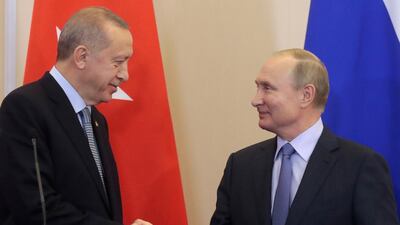When Russian President Vladimir Putin meets Turkey’s Recep Tayyip Erdogan on Wednesday to inaugurate a Black Sea gas pipeline between their countries, the two leaders are likely to be focusing on recent matters that have inflamed the wider region.
Alongside the conflict in Syria – Mr Erdogan is concerned over a fresh assault in Idlib by Mr Putin’s ally Bashar Al Assad – the crisis surrounding Iran and Turkey’s deepening involvement in Libya will top the agenda in Istanbul.
The leaders have built a good rapport in recent years despite being on opposing sides in Syria, where Russia and Iran back Mr Al Assad while Turkey supports opposition groups.
Turkey’s decision to send troops to Libya in support of the Tripoli-based government mirrors the situation in Syria, with Moscow backing the eastern-based forces besieging the capital and which took the city of Sirte on Monday.
Ankara has sent a limited number of troops to Libya following a parliamentary vote last week. However, there are widespread reports that Turkey-backed Syrian fighters have also been flown in to help the Tripoli regime. As in Syria, Russia has mercenaries fighting for the opposing side.
On Monday, Russia called a meeting of the UN Security Council to discuss Libya amid international condemnation of Ankara’s military plans.
Coincidentally, Russia and Turkey’s involvement in Libya could hinge on gas reserves in the eastern Mediterranean, where Turkey has been involved in a stand-off with Cyprus, Greece and others over exploration rights.
In November, Ankara and Tripoli signed an agreement on maritime boundaries that would threaten Cypriot, Greek and Israeli plans for a pipeline to Europe.
“Turkey’s involvement in Libya is a quid pro quo for the maritime agreement in the eastern Mediterranean which disrupts plans for a gas pipeline,” said Ahmet Evin, a senior scholar at Sabanci University’s Istanbul Policy Centre.
“It throws a major monkey wrench in the deal.”
Ali Bakeer, an Ankara-based political analyst and researcher, said today’s meeting could see Mr Erdogan seek Russian disengagement from Libya.
“Turkey will ask Russia to pull its mercenaries out and in return Russia will ask for something,” he said. “I think Turkey can offer Russian companies some share in gas exploration in the eastern Mediterranean.”
He added: “For Turkey, Libya has great strategic importance because losing Libya would isolate Turkey in the east Mediterranean. Historically, even under [Muammar] Qaddafi Turkey had huge commercial interests and now it has interests in construction worth tens of billions of dollars.”
Meanwhile, Ankara and Moscow were caught by surprise when the US killed Iranian commander Qassem Suleimani on Friday.
The Kremlin condemned the assassination of one of its ally's most senior figures while Turkey was more circumspect, issuing a statement saying the killing would destabilise the region.
Although on opposite sides to Russia and Iran in Syria, Turkey joined them in 2017 to create the Astana peace process and the leaders of all three have worked together since to bring an end to the conflict.
Russia and Turkey will both seek to avoid any escalating Iran-US conflict spilling into Syria, where Turkey has succeeded in pushing back Kurdish fighters from its border and Russia has helped Mr Al Assad’s forces regain control of most of the country.
“Moscow has a particular plan to control that area and the greater game there will see Russia remind Iran to cool down any immediate retaliation,” Prof Evin said. “Syria is currently stabilising to the liking of Russia.”
While a US-Iran confrontation could benefit Turkey by weakening Iran, Dr Bakeer said further turmoil in Syria or Iraq – both countries where Iranian-backed forces have significant sway – would damage Turkey’s interests.

